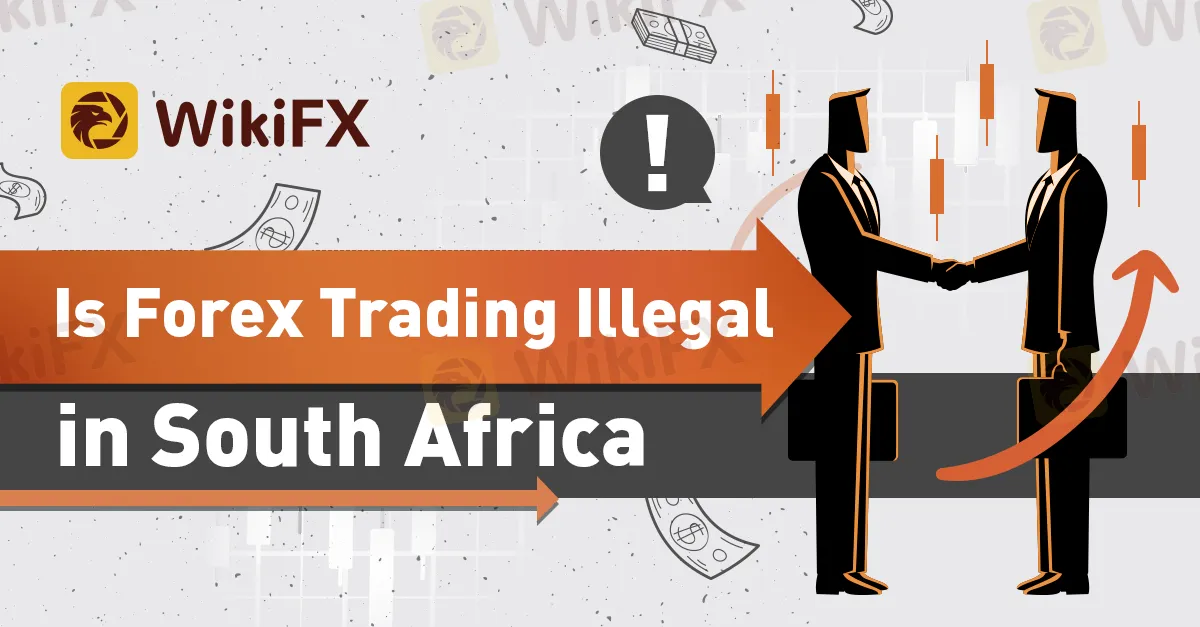简体中文
繁體中文
English
Pусский
日本語
ภาษาไทย
Tiếng Việt
Bahasa Indonesia
Español
हिन्दी
Filippiiniläinen
Français
Deutsch
Português
Türkçe
한국어
العربية
Is Forex Trading Illegal in South Africa
Abstract:Trading Forex is allowed in South Africa because the South African government has no legislation restricting its legality. The South African Reserve Bank is in charge of foreign monetary exchange and oversees the country's outgoing cash flow (1). Forex trading is allowed as long as you follow financial regulations that prohibit money laundering(2) and declare your earnings. While hiring a licensed broker is not required by law, there are brokers who are regulated by our own FSCA(3) and others who are regulated by other internationally recognized organizations.

Trading Forex is allowed in South Africa because the South African government has no legislation restricting its legality. The South African Reserve Bank is in charge of foreign monetary exchange and oversees the country's outgoing cash flow (1). Forex trading is allowed as long as you follow financial regulations that prohibit money laundering(2) and declare your earnings. While hiring a licensed broker is not required by law, there are brokers who are regulated by our own FSCA(3) and others who are regulated by other internationally recognized organizations.
Funding Forex Accounts Legally
If you use a credit card linked to a major bank in South Africa, funding an account is rather simple. However, whether we try to finance overseas accounts from South African bank accounts(1) or local lesser-known credit cards, South African financial restrictions can get in the way. This is happening less frequently, but we continue to hear that the problem exists. South Africans have been able to lawfully shift more money to offshore bank accounts since 2010, making it easier to fund a Forex account. While each South African person still has a limit on how much money they can send abroad, they now have a 10 million Rand allowance.
Foreign Currency Allowance on a Discretionary Basis
Another way to move money out of the country is to apply for a discretionary foreign currency allowance, which can be worth up to 1 million Rand. The yearly R1 million discretionary allowance law was revised on October 27, 2011, to cover overseas investments. The South African Revenue Service must clear this, as well as the initial R10 million (SARS). Fill out the MP 1423 form for the $1 million travel allowance to get started.
Over ten million ZAR are transferred each year.
Your bank will need to submit an application to the South African Reserve Bank's Financial Surveillance Department for clearance in order to transfer up to 10 million ZAR each year - contact them here. This application will not be considered complete without a Tax Clearance Certificate. If you wish to send a big sum of money to a brokerage, you should first open an offshore bank account and then fund your Forex and offshore investing accounts from there. It does mean, however, that you will not be obliged to repatriate funds and then go through the procedure of obtaining approval and transferring the funds again if you want to create further accounts with other brokers.
Anti-Money Laundering (AML) stands for Know Your Customer.
KYC is a program that has been used by banks and financial institutions all around the world. It is a law enacted to prevent anonymous actors from launder money. You will need to submit your KYC documentation when you sign up for a Forex trading account and before you can make a deposit. It's quite simple. It necessitates that you submit: A color copy of a valid photo ID, such as a passport, driver's license, or identification card. A recent utility bill (e.g., electricity, gas, water, phone, oil, Internet and/or cable TV connection, bank account statement) that proves your home address and was issued within the last three months.
Disclaimer:
The views in this article only represent the author's personal views, and do not constitute investment advice on this platform. This platform does not guarantee the accuracy, completeness and timeliness of the information in the article, and will not be liable for any loss caused by the use of or reliance on the information in the article.
WikiFX Broker
Latest News
Interactive Brokers Launches Forecast Contracts in Canada for Market Predictions
Authorities Alert: MAS Impersonation Scam Hits Singapore
INFINOX Partners with Acelerador Racing for Porsche Cup Brazil 2025
The Impact of Interest Rate Decisions on the Forex Market
Billboard Warns of Crypto Scams Using Its Name – Stay Alert!
STARTRADER Spreads Kindness Through Ramadan Campaign
Rising WhatsApp Scams Highlight Need for Stronger User Protections
A Trader’s Worst Mistake: Overlooking Broker Reviews Could Cost You Everything
How a Housewife Lost RM288,235 in a Facebook Investment Scam
The Daily Habits of a Profitable Trader
Currency Calculator







